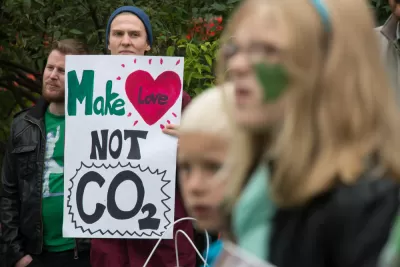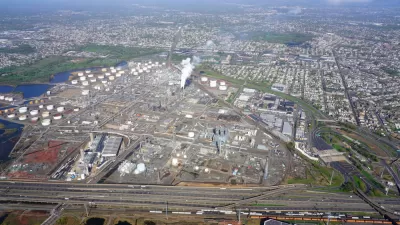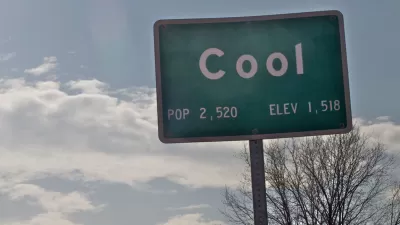Are 'zero carbon' goals the most effective way to cut greenhouse gases, or are they the most politically feasible strategies? NPR climate and environment reporter, Nathan Rott, explores the challenge in an interview on All Things Considered.

"This summer we'll be exploring what exactly carbon neutral means and whether getting to zero carbon, as some people put it, is even possible," states Ari Shapiro, a host of All Things Considered, at the beginning of the nearly 5-minute audio version of the article which differs from the text.
"World scientists are telling us that we basically have until 2050 to get all of our carbon emissions to net zero if we hope to avoid the worst impacts of climate change," explains Rott. Last October's Intergovernmental Panel on Climate Change (IPCC) special report requires that "[g]lobal net human-caused emissions of carbon dioxide (CO2) would need to fall by about 45 percent from 2010 levels by 2030, reaching ‘net zero’ around 2050," in order to limit global warming increase to 1.5°C.
With climate action stuck in reverse on the federal level due to the Trump administration rolling back regulations to cut emissions, "a growing number of cities, states, electric utilities and businesses are recognizing the risk presented by climate change and making their own pledges to reduce emissions," adds Rott.
Four states — Washington [and Nevada], New Mexico, California and Hawaii — as well as Puerto Rico and Washington, D.C., are leading the decarbonization charge, making commitments to get all of their electricity from carbon-free or carbon-neutral sources in the next few decades. [Add New York to that prestigious group soon].
More than 100 cities and counties have signed similar pledges, and at least three presidential candidates are proposing climate plans that call for the U.S. to become carbon-neutral by 2050. [Vice President Biden's and Mayor Pete Buttigieg's policies critiqued here].
"Is it even possible to get to zero carbon by 2050?" asks Shapiro. Short answer: It depends on whom you ask.
There are some energy analysts and academics, like Mark Jacobson, director of the Atmosphere and Energy Program at Stanford University, who say the answer is a resounding yes..."It's technologically and economically possible," he says. "But there are social and political barriers."
Rott adds that the challenges are so formidable that "we may even have to find ways to pull carbon out of the atmosphere," a form of carbon capture.
Shapiro asks the key question in the interview (at 3:00 in the audio version:)
"[C]ities, states, (and big companies) have made an effort to get to zero carbon," acknowledges Shapiro. "Would those be enough to bring about the kinds of change that you are talking about?"
"No, that's because most of [these] efforts are just trying to take on one piece of the larger greenhouse gas emissions pie, and that is electricity," responds Rott, who goes on to mention, and to a certain extent, discount the efforts of some of the aforementioned cities and states that have committed to increasing their use of renewable or carbon-free energy sources, also known as a renewable portfolio standards or RPS.
"Twenty-nine states, Washington, D.C., and three territories have adopted an RPS, while eight states and one territory have set renewable energy goals," according to a February 1 analysis by the National Council of State Legislatures.
The problem is that "electrical generation only accounts for 28 percent of the total emissions in the U.S.," explains Rott.

Courtesy of U.S. Environmental Protection Agency
Alternative to net zero energy goals: carbon pricing
"So, energy economists, policy academics, will tell you that the best way to cut emissions across all sectors would be to put something in place like a carbon tax," adds Rott. The problem is that "a carbon tax, right now, is not politically feasible."
These zero carbon plans from cities, states and businesses are feasible in some places, and that's why we are seeing them. I talked to Leah Stokes, an assistant professor of political science at the University of California, Santa Barbara, who studies carbon policy and these zero carbon efforts, and she says these efforts will help cut emissions but...we need to be moving faster.
For cities or counties making renewable commitments, "many of them don't really have the tools to implement their vision," says Stokes. "Utilities often work at the state level, not the local level."
Sanya Carley, an associate professor at Indiana University's School of Public and Environmental Affairs, agrees. From the text of the source article:
Are 'zero carbon' goals the most effective way to cut greenhouse gases?
"All evidence points to no," says Carley. "The most efficient and cost-effective way to reduce carbon emissions would be directly pricing carbon and putting a price tag on the cost of those emissions."
A 2018 study by the Massachusetts Institute of Technology [and the National Renewable Energy Laboratory (NREL), part of the U.S. Department of Energy,] found that putting a price on carbon and returning the revenue from it to the public would reduce greenhouse gas emissions. The higher the cost, the greater the reductions.
Polling favors green investments over taxing carbon emissions
On Friday, Robinson Meyer, who covers climate change for The Atlantic, reports on June 21 that a Green New Deal-like "massive investment plan" is now favored by the public, replacing a carbon tax, including "a 'revenue neutral' version, distributing the funds back to Americans in the form of a quarterly check," as being the preferred strategy among the public to tackle climate change.
About 59 percent of Americans support a Green New Deal–style package of climate investment and regulation, according to a June poll [pdf] from YouGov and Data for Progress, a left-leaning think tank. About 22 percent of Americans oppose such a plan.
Only 50 percent of respondents supported a tax on carbon pollution, while 30 percent said they somewhat or strongly opposed it.
There could be a simple economic explanation for the poll's findings on how people react to the two climate strategies. A carbon tax, even one that returns revenue to the public, would likely increase the cost of electricity, natural gas, and gasoline for every energy consumer while the Green New Deal investments would appear to be financed by "an income tax rate as high as 60 to 70 percent on the highest-earning Americans...with dramatic increases on especially high earnings, such as $10 million," as proposed by Rep. Alexandria Ocasio-Cortez (D-N.Y.) in January.
“While the carbon tax is making inroads on the right, it is losing support on the left because of perceived new urgency on climate, coalition demands, and a growing anti-capitalist sentiment,” said Joseph Majkut, a climate scientist at the libertarian Niskanen Center, in an email to Meyer.
Bottom line: Zero carbon goals are pragmatic, but not broad-based, and therefore not as effective as carbon pricing, which remains somewhat elusive in the United States, with two notable exceptions in nine Mid-Atlantic and Northeast states (soon to be ten) and California.
FULL STORY: Going 'Zero Carbon' Is All The Rage. But Will It Slow Climate Change?

Alabama: Trump Terminates Settlements for Black Communities Harmed By Raw Sewage
Trump deemed the landmark civil rights agreement “illegal DEI and environmental justice policy.”

Study: Maui’s Plan to Convert Vacation Rentals to Long-Term Housing Could Cause Nearly $1 Billion Economic Loss
The plan would reduce visitor accommodation by 25% resulting in 1,900 jobs lost.

Planetizen Federal Action Tracker
A weekly monitor of how Trump’s orders and actions are impacting planners and planning in America.

Wind Energy on the Rise Despite Federal Policy Reversal
The Trump administration is revoking federal support for renewable energy, but demand for new projects continues unabated.

Passengers Flock to Caltrain After Electrification
The new electric trains are running faster and more reliably, leading to strong ridership growth on the Bay Area rail system.

Texas Churches Rally Behind ‘Yes in God’s Back Yard’ Legislation
Religious leaders want the state to reduce zoning regulations to streamline leasing church-owned land to housing developers.
Urban Design for Planners 1: Software Tools
This six-course series explores essential urban design concepts using open source software and equips planners with the tools they need to participate fully in the urban design process.
Planning for Universal Design
Learn the tools for implementing Universal Design in planning regulations.
Caltrans
Smith Gee Studio
Institute for Housing and Urban Development Studies (IHS)
City of Grandview
Harvard GSD Executive Education
Toledo-Lucas County Plan Commissions
Salt Lake City
NYU Wagner Graduate School of Public Service





























